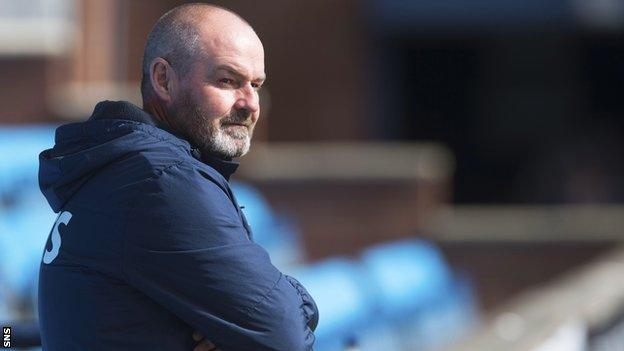Steve Clarke appointment immediately boosts Scotland's hopes
- Published

Steve Clarke has answered Scotland's call to take on the national team
If you're going to put together a fantasy team from the players the new Scotland head coach Steve Clarke has coached in his lifetime then you might want to set aside a few hours because the options are a little bit scary.
There's a point to this, a reason why we're running through the stellar names that Clarke has been out on the coaching pitch with in his days as assistant at Newcastle, Chelsea, Liverpool and as manager of West Brom. We'll come to that reason shortly, but for now let's indulge ourselves in his star-studded past.
In goal you have three options - Petr Cech, Pepe Reina and Shay Given. In defence, eight options - John Terry, Ricardo Carvalho, Ashley Cole, Jamie Carragher, Paulo Ferreira, William Gallas, Daniel Agger and Martin Skrtel.
There are eight candidates for the midfield, too: Frank Lampard, Steven Gerrard, Claude Makelele, Arjen Robben, Michael Essien, Michael Ballack, Raheem Sterling and Damian Duff.
Up front, six heavyweights: Alan Shearer, Luis Suarez, Didier Drogba, Hernan Crespo, Andriy Shevchenko and Romelu Lukaku.
It's quite a cast list. The former West Brom striker, Lukaku, once said of Clarke: "He changed my life, showing me how the game works. Without him I could not have gone to the next level." There's a battalion of players at Clarke's previous employers Kilmarnock who would echo those words.
'SFA deserve credit'
Why mention the superstars of before rather than the more down-to-earth warriors he has coached over the past two seasons? Because it illustrates that Clarke is at home in either company. He built a reputation as a coach of box office talents and enhanced it when working with altogether different characters in what must have seemed like the parallel universe of Rugby Park. He has received plaudits from many famous players but he's not the type of manager who desperately needs superstars in order to function. He's shown that most spectacularly at Kilmarnock.
He has coached and inspired in equal measure. He took a disparate, down-on-their-luck group and made them better. He took an angry and disaffected and dwindling support and galvanised them way beyond what anybody with an experience of what the club had become thought possible.
Before he arrived, Killie had no direction and no hope. The strength of his coaching and the resilience of his personality changed everything. Reina spoke about this once. The former Liverpool goalkeeper said that Clarke was the one recognising the problems at Anfield and he was the one coming up with the solutions. The information he was imparting was complicated, but he made it sound simple. That's what the best coaches and managers do.
'Sorry I didn't win you a trophy' - Clarke addresses Kilmarnock fans
You have to feel for Killie people. Nobody knows where he might have taken the club had he stayed another season or two and that will forever remain a frustration. They'll be tormented by what-might-have-beens for a long time. Killie had the vision to appoint him when others ignored him. And now he's gone, lured away by his country and the so-called greater good. It's not just on the pitch where football shows its cruel side.
Clarke is the rarest of beasts - a Scottish FA appointment that is greeted with near unanimous praise, once you take the Killie groans and gnashing of teeth out of the equation. There is no comparison to the embarrassment of the unveiling of Alex McLeish, viewed as it was as some kind of old pals act with his friend, Alan McRae, the president at Hampden.
The new man is there on merit as first-choice target from day one. Ian Maxwell, the chief executive, deserves praise for getting him. Some might say it was a foregone conclusion that Clarke would take the job, but it wasn't.
Clarke has finely attuned antennae that start to twitch when he's in the company of people he sees as bluffers. He would have been interviewing Maxwell just as much, and probably more, than Maxwell was interviewing him. What we've learned about him in his Killie years leads us to believe that had he the slightest doubt about the folk employing him at Hampden he'd have been out of there like a shot, probably decrying their amateurism as he went. After the McLeish debacle, this was a process that needed to be handled carefully and professionally.
When Clarke took over Killie the first thing he had to do was lift the gloom and persuade everybody, players and fans, that being mediocre need not be a permanent state. There was a fatalism in Killie just as there is a fatalism in Scotland. Wretched results tend to grind down the most ebullient supporter after a while.
What he did at Rugby Park he now needs to roll out nationwide. Getting players organised and knowing their role to the nth degree. Getting players inspired and believing that they can beat anybody, no matter the odds. Getting the dead weight of expectation off their shoulders and getting a smile back on their face.
With Scotland these days the temptation is to ring a bell before a game rather than blow a whistle. In their past two games they have looked utterly miserable. Haunted, even. Clarke will need to lighten the mood. Free them up. Make football fun again.
'A reassuring presence, a strong character, a proven leader'
He improved practically every Killie player on his watch. He had time, of course. The kind of time that he won't have when he's meeting up with his new players for a week or two and then not getting to work with them - and work on them - for months.
That's the great challenge, but it's also a great opportunity because this group of Scotland players are capable of better things. Clarke doesn't tend to show emotion all that much, but privately he must be excited by some of the talent he's going to be working with.

Scotland resume their Euro 2020 qualifying campaign next month
Andy Robertson, one of the best left-backs in the world, is the totem, but the supporting cast is highly encouraging - Kieran Tierney, Scott McKenna, John Souttar, Callum McGregor, Scott McTominay, James Forrest, Ryan Fraser.
Kenny McLean of Norwich and John Fleck of Sheffield United will both be playing in the Premier League next season. Graeme Shinnie's new club, Derby, are playing John McGinn's Aston Villa to determine who will join them. Motherwell's David Turnbull might be worth a look soon. There are decent players out there. Lots of them.
There are other guys who Clarke will want to talk to, guys who have disappeared from the national team in recent times because of circumstances unknown - Tom Cairney, Matt Ritchie, Robert Snodgrass, James McArthur. Clarke is going to ask them a very simple question - are you in or are you out? Final answer, boys.
Clarke is a reassuring presence, a strong character, a proven leader. There are no guarantees that he's going to get Scotland into a major championship but the moment he was announced as the new manager the odds sure did shorten.
